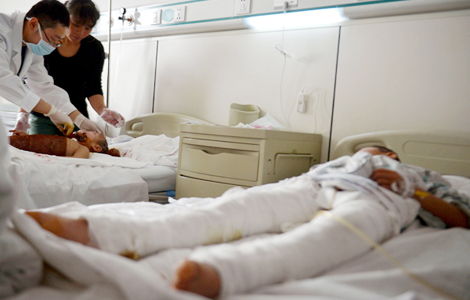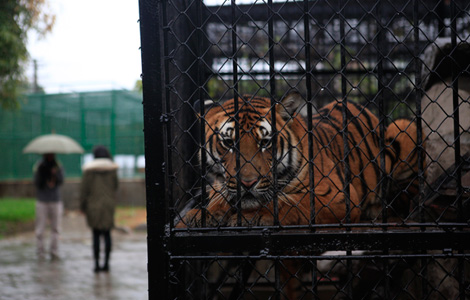Guangdong worries bird flu outbreak is possible
Updated: 2013-12-19 08:26
By Zheng Caixiong in Guangzhou and Shan Juan in Beijing (China Daily USA)
|
||||||||
Guangdong province has warned of a possible outbreak of H7N9 bird flu in the coming months after a new case was reported on Wednesday.
Zhang Yonghui, director of Guangdong provincial center of disease control, warned that Guangdong has entered a peak period for flu cases.
Cities in the Pearl River Delta, which borders Hong Kong and Macao, have higher risks of an outbreak of H7N9 in winter and spring, "the traditionally peak period for flu", Zhang said.
A case of H7N9 flu, the fifth in Guangdong province, was confirmed in Yangjiang on Wednesday, according to the Guangdong Provincial Department of Health.
The new patient, a 62-year-old resident surnamed Liang is in critical condition.
This is the third human H7N9 case in four days, bringing the total H7N9 cases in the province to five since August.
Dongguan and Huizhou have also reported H7N9 cases.
Chen Yuansheng, director of the Guangdong Provincial Department of Health, has urged doctors across the province to get ready to fight the disease.
"Hospitals should prepare enough medicine, while doctors should be well-trained to help handle the possible increase in H7N9 bird flu patients," Chen said.
Chen said patients who have been in contact with poultry and have a fever and other flu symptoms should be treated with Tamiflu within 48 hours of when they fall ill.
"Hospitals, doctors and other medical personnel will be punished or held responsible for their delay in treating patients," Chen said at a televised conference on preventing and fighting H7N9 bird flu in Guangzhou on Tuesday afternoon.
He stressed the need for early discovery, diagnosis and treatment.
Lin Shaochun, deputy governor of the province, has urged government departments to take concrete and effective measures to prevent and fight H7N9 bird flu in the coming months.
The agricultural department has been asked to tighten management of poultry farms, ensure only healthy live poultry is sold to local markets, and see that all vehicles transporting poultry are sterilized before operation, Lin said.
The forestry department will spare no effort in fighting the illegal trade of wild birds and further standardizing the operation of farms that raise birds and poultry.
Industrial and commercial administrations will ban imports of birds and domestic poultry from other provinces, and all markets will be required to clean and sterilize regularly, he added.
Feng Zijian, director of the health emergency center of the Chinese Center for Disease Control and Prevention, said there will be sporadic human cases of H7N9 throughout the winter and coming spring on the Chinese mainland.
The mainland has reported 142 human cases of the bird flu virus since it emerged in March, including fewer than 10 cases since October.
In response, the health and agriculture departments have beefed up regular monitoring of suspected flu cases and the working capacity of medical institutions nationwide for the timely diagnosis and treatment of patients, Feng said.
Research and development of H7N9 vaccines for human use is underway, but the use, once a vaccine is available, needs more research and assessment, Feng said.
Usually, vaccines protecting people from a virus that infects both humans and animals are developed preliminarily for strategic cases, rather than immediate mass use, the expert said.
Contact the writers at zhengcaixiong@chinadaily.com.cn and shanjuan@chinadaily.com.cn
(China Daily USA 12/19/2013 page4)

 Misses International shine in Tokyo
Misses International shine in Tokyo
 Parents urged to supervise children's TV-viewing habits
Parents urged to supervise children's TV-viewing habits
 Jazzing up Beijing
Jazzing up Beijing
 US delegation to Sochi includes gay athletes
US delegation to Sochi includes gay athletes
 Snow storm wallops NE USA
Snow storm wallops NE USA Russia to bail out Ukraine for $15 billion
Russia to bail out Ukraine for $15 billion
 Fatal tiger attack 'points to flaws in zoo management'
Fatal tiger attack 'points to flaws in zoo management'
 Merkel sworn in as chancellor for a third term
Merkel sworn in as chancellor for a third term
Most Viewed
Editor's Picks

|

|

|

|

|

|
Today's Top News
Baucus likely next ambassador to China
Senator Baucus to be named ambassador to China
China’s leaders must lead on clean energy: report
Treasure Island still radioactive?
Military plays down 'near-miss' between warships
Fed to cut bond purchases by $10B
Overseas investing sees large jump
China expands research in Antarctica
US Weekly

|

|







